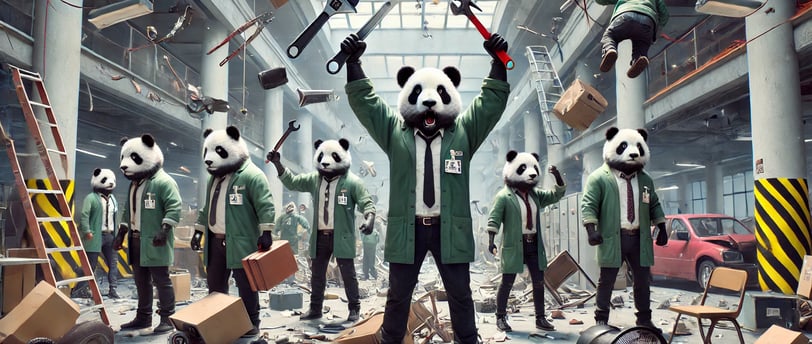Why Does Nobody Want to Work Anymore? Uncovering the Real Reasons
Discover why many people say "nobody wants to work anymore." We explore labor force trends, wage concerns, job dissatisfaction, and the evolving work economy.
Dr.Pan
12/9/20244 min read


The Truth Behind "Nobody WantsYou've probably heard it at your local coffee shop, seen it plastered across social media, or maybe even muttered it yourself while waiting 40 minutes for a table at an understaffed restaurant: "Nobody wants to work anymore." It's become the battle cry of frustrated business owners and the eye-roll trigger of millennials and Gen Z alike. But here's where things get interesting - and trust me, this rabbit hole goes deep.
🔥 ESCAPE THE 9-5: Watch How AI Earns $10K/Month While You Sleep — No Boss, No Deadlines, No Stress!
The Money Myth: More Than Just Empty Pockets
Let's talk about wages, but not in the way you might expect. Sure, we all know prices are rising, but the real story is in the math that nobody wants to acknowledge. Picture this: In 1970, you could work a summer job and pay for a year of college. Try that today and you'll barely cover your textbooks. When people say "wages haven't kept up with inflation," they're not just throwing around economic jargon - they're describing a system where working 40 hours a week at minimum wage won't even rent you a one-bedroom apartment in most major cities.
But here's the kicker - it's not just about the numbers on your paycheck. It's about what those numbers mean for your life choices. Can you start a family? Save for retirement? Take a vacation once in a while without going into debt? For many workers, the answer is a resounding "no," and that's where the real disillusionment begins.
The Soul-Crushing Reality of Modern Work
Now, let's dive into something that doesn't get enough attention: the psychological toll of today's workplace. That statistic about only 20% of people feeling engaged at work? It's actually even more fascinating when you dig deeper. We're talking about people spending the majority of their waking hours in environments that literally drain their will to live - and I'm not being dramatic here.
Picture spending your days under fluorescent lights, managing an inbox that fills up faster than you can empty it, while your manager breathes down your neck about "synergy" and "optimization." Oh, and don't forget those "optional" team-building exercises that are about as optional as breathing. Is it any wonder people are saying "thanks, but no thanks"?
The Automation Revolution: More Complex Than You Think
Here's where things get really interesting - and a bit sci-fi, except it's happening right now. We're not just talking about robots replacing assembly line workers anymore. AI is coming for white-collar jobs too. That comfortable office job you thought was safe? There's probably an algorithm being developed right now that can do parts of it faster and cheaper.
But here's the plot twist: automation isn't inherently bad. The problem is we're horrible at handling the transition. Imagine being a skilled worker with 20 years of experience, and suddenly your entire industry transforms. Society basically tells you, "Sorry, should have learned to code!" as if learning complex new skills while paying bills and supporting a family is as simple as downloading a new app.
⚠️ TIRED OF BEING UNDERPAID? Watch How AI Pays 5X More Than a 9-5 Job — Work Smarter, Not Harder!
The Social Media Delusion
This part is fascinating - and a bit maddening. Social media has created a parallel universe where everyone seems to be a CEO by 25, working four hours a week while traveling the world. It's like we're all watching a highlight reel of success and wondering why our daily life looks more like the blooper reel.
That survey showing Gen Z workers expecting $600,000 salaries? Let's put that in context. These aren't just random numbers pulled from thin air - they're a direct result of being bombarded with images of luxury lifestyles and "hustle culture" success stories. When your Instagram feed is full of 22-year-olds supposedly making millions from their phone, a regular job starts to look like settling for failure.
The Geographic Lottery
Here's something that'll make you think: your zip code might be determining your destiny more than your work ethic. Imagine two equally talented people - one born in Silicon Valley, the other in a former manufacturing town in the Rust Belt. Same skills, same drive, wildly different opportunities. It's like playing Monopoly where some players start with Boardwalk and Park Place, while others get Baltic Avenue and a pat on the back.
Looking Forward: The Solutions Nobody's Talking About
Sure, higher wages would help. Remote work options are great. But let's talk about the solutions nobody's addressing:
What if we completely reimagined the work week? The 40-hour standard was created for factory workers in the 1920s. Are we really saying we can't do better a century later?
What about universal basic income? Not as a handout, but as a foundation that allows people to take risks, start businesses, or retrain for new careers without facing homelessness if they fail?
The real conversation isn't about people not wanting to work - it's about people not wanting to participate in a system that feels increasingly rigged against them. And that's a conversation worth having.
So the next time someone says "nobody wants to work anymore," maybe ask them: "Work like what, exactly? And for what kind of life?" Because that's where the real story begins.
Unlock the best deals, coupon codes, and exclusive announcements from your favorite brands – all in one place. Stay informed with up-to-date stories, expert tips, and special offers tailored just for you.
✨ Why Join?
✔ Break Through Mental Blocks: Get expert tips to boost your mindset.
✔ Exclusive Deals & Discounts: Never miss a money-saving coupon or promo.
✔ Stay in the Know: Be the first to hear about new products, events, and insider updates.
📬 Sign Up Now – It’s free, easy, and your all-access pass to what matters most!
© 2024. All rights reserved.
